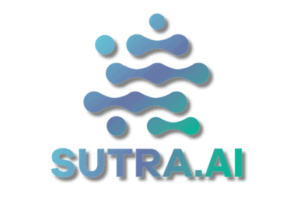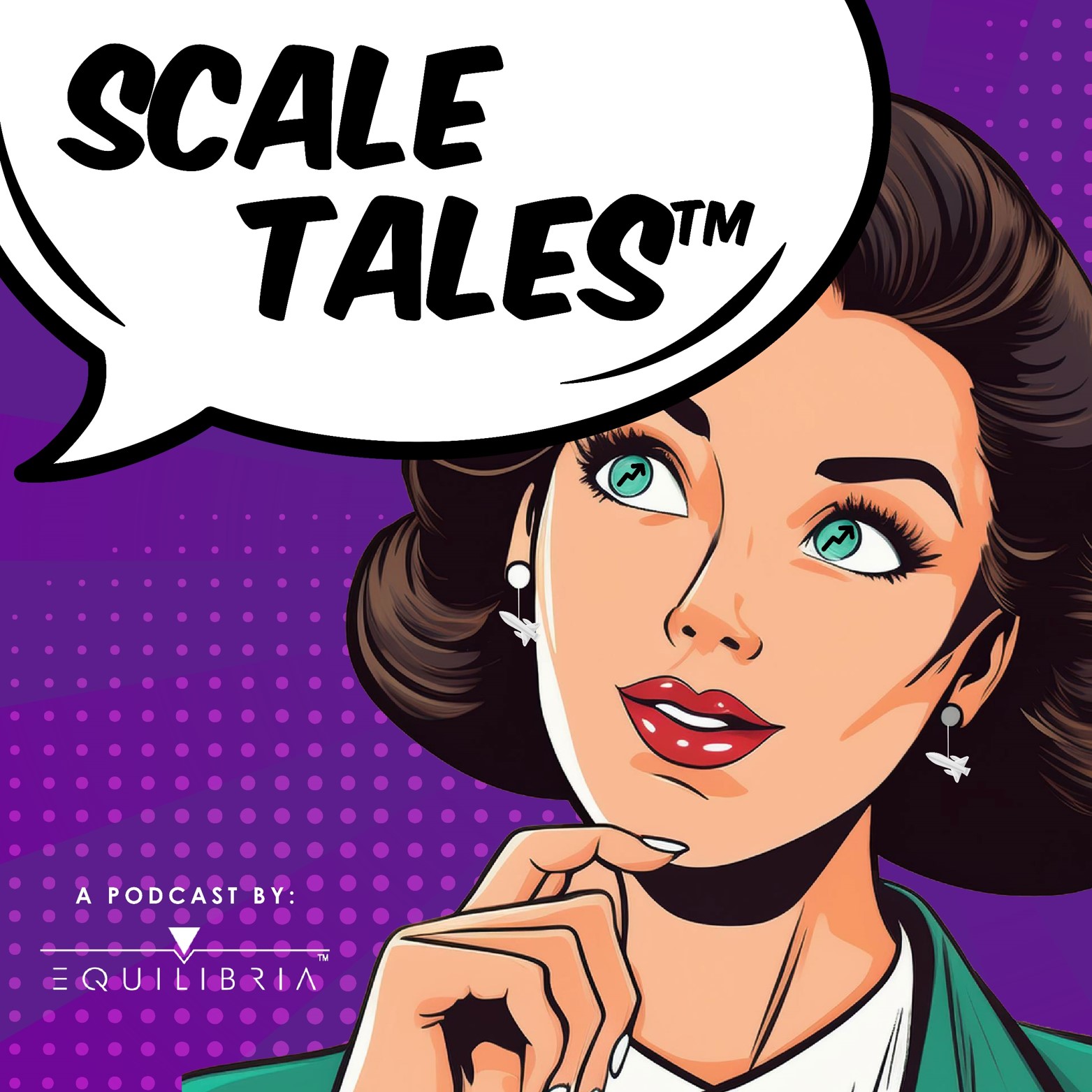Transcript
This podcast is brought to you by Equilibria, Inc. Did you know you can earn PDUs from listening to this show? It’s easy, accessible, and submitted directly to PMI. Keep listening to learn more.
Equilibria, Inc. Equilibria provides training to assist fast-growing companies in documenting and improving their key processes for maximum operational performance. Visit EQBsystems.com to stop the chaos of fast growth and start flowing today! EQBsystems.com.

Welcome to Scale Tales – the business storytelling podcast where entrepreneurs, executives and experts share firsthand accounts of those magical moments when they achieved something bigger than even they could have imagined.
I’m your host, Alicia Butler Pierre and if you’re new to the show, welcome! And for our loyal listeners, thank you for coming back! Together, we’ve learned so much about how others have scaled revenue, impact, teams, and profits. I don’t know about you, but I find these stories to be absolutely fascinating especially as guests willingly share how they achieved scale. One tool many of them are utilizing more and more to achieve scale is AI.
Our next guest is an AI pioneer, having created an AI tech company back in 2012. This may not seem like a big deal now, but when you consider that AI was an obscure technology back then, it’s impressive. And this is just one of the stories he’ll share. You’re actually about to get a three for one deal in this episode and…if you listen to the end, there’s a special offer to try a new AI product that he’ll reveal.
This is Ep. 33: Dilip Dubey Shares How He Scaled an AI Company Back in 2012 to Over $100 Million.
Hello, I am Dilip Dubey. I’m an AI entrepreneur, investor and inventor. I’m currently in Troy, Michigan and this is my scale tale.

It started in August of 1999 when I started my first company called NetLink in my basement in Troy, Michigan. At that time I was in a very nice cushy job with a great local company in Michigan and me and my wife quickly went from two income and no kids to two kids and no income. The first company I started scaled from my basement to cold calling to over $100 million in revenue with almost no investment.
Thousand dollars from me and my co-founder and that business still is running. 15 years down the road I started another company. This time around I raised over 100 million and scaled that business which was which exited in 2019 to three private equity companies from New York. So happy to be here to talk about both of these stories. First company was tech
software. The second company was an AI company in 2012.
Can you imagine talking about AI solving your real-life problems in 2012? I had a chance to go to amazing customers in 2012 for this AI company and talk about, Hey, I can really change your world using AI. And literally the only question they had in mind was should we laugh at his face or should we let him leave the room before we make that gesture? And of course came ChatGPT and suddenly you can’t enter a room if you are in tech and not talk about AI to share ideas or share solutions that you may be pitching to your customers.
So delighted to be here to share. Both of these companies, how they started and how they scaled, of course took completely different journeys to get to it again. First company, 0 to 100 million with no capital, took 15 years. Second company, 100 million in capital and only took six years to get to an exit.
I asked Dilip to take us back to 1999. I remember that year well. It was the year I graduated from university. Although the internet was around, it was mainly dial-up connections. There was no [gasp] wi-fi. Google launched a year earlier, but it was Yahoo! that everyone used for searching. And email was just taking off as a viable way to communicate. This was the environment in which Dilip and his co-founder pitched their first business, NetLink.
Software as a service doesn’t even exist, and the concept that we were pitching at that time of reusable code was a unique thing. So what now is called platform as a service at that time was basically just some new concept that a few young people were pitching out of college, that was us.
And that’s how we started. We went to large companies, and said, we could reduce your software development load and cost by as much as 70, 80% by reusing the code from one application to other. And as obvious as that sounds today, it was not a thing at that time. Every company wanted everything to be developed from scratch. And that’s how we scaled. We competed against big guys at that time, Microsoft, IBM.
And they looked around the table and said, Hey, who are these two people sitting here competing with us? Big giants. They did good work, but they did not have this approach. And that allowed us to scale very quickly. Of course, we all know, things never go in straight line. We went through struggling to suddenly have two big customers and exponentially raise the value of the business and the value we created for our customers. If you look at an inflection point or scale point for us was just few customers all within the same year, adopting this new way of doing business and redoing their contracts and accepting it.
It took us almost four years to mature. The idea was great, proof points were great, but because the contracts were written differently, because everybody was conditioned to operate in a model which was different, this reusable code model that we were pitching, it took us four years to really scale, to get to a decent level of revenue. We went struggling for zero revenue, cold calling to a few million dollars revenue in four years. And from there we went to 100 million in next 10 years.
The second company that I scaled was called Ziva. And then the company that we are scaling now, the third company, and this time, having sold companies before I had couple of bucks to invest of my own money and this company has scaled from $0 to $100 million in valuation with less than million dollars in investment. So maybe there are three stories here, not just two.
I’m sure you don’t mind if Dilip has more scale tales to share, right? The more, the better as I’m sure there are important lessons we can learn from all of them. So, Dilip, please continue.
When you start your first company, especially as we did, you have a lot of passion. You want to be that Google or Microsoft. You are really learning as you go. You make lots of mistakes. Looking back that was part of our learning. It wasn’t like you can build companies without making mistakes.
Most part of the first four years was just iterating through what we were doing right or wrong. The advantage we had was in 1999 the world was not moving very fast so you had a chance to make mistakes, learn, grow, build a business at a smaller pace if you had a unique or differentiated idea that you were pitching to your clients.
One thing we did learn is at early stage you need to raise money, that’s definitely a good option. You can of course save some of the equity and your ownership in the business, but you still need amazing partners and we had them. I had amazing advisors, people who are willing to put in their balance sheet behind our business.
As we scaled and built $10 million a year contracts as part of our book of business, there were great advisors who had scaled businesses before who would come in and tell me that
“Dilip, you should go left, but I know you would not listen, you’re going to go right. And two board meetings from now you will agree with me.”
And of course I said, “No, I’m smarter than that. I know what I am doing.”
And typically six months down the road you would say, “Ah, maybe I should have listened more.” So having that group of advisors who have your best interest at heart and you’d be surprised how many people exist who have scaled and done good things in their businesses who are just willing to share and help.
A secret here is many of them are just bored out of their mind. So if you approach them and say, “Would you please advise and help?” they will be delighted to engage. And that I think was very helpful in scaling and not making mistakes once we were big enough. But those mistakes could have cost us our whole business.
I wondered if those mistakes that advisors helped Dilip and his co-founder avoid would have turned their scaling inflection point into a downward spiral had they not heeded their advice. Pay attention as Dilip talks about his first company, NetLink.
A great question, Alicia. There was tremendous excitement when we closed these two deals in a very short span, within a month of each other. And then the next step was panic. Because we had four years to just hustle, struggle, figure out how to convince clients that what we are saying and approaching had tremendous value for their businesses. But when the yes came through and the contracts were signed and things were really big, we did struggle to scale. We had to quickly lean on these advisors who were able to share what kind of talent to recruit.
What kind of next level keep leadership to recruit. It was quite clear that me and my cofounder would not be able to scale these businesses by ourselves by hiring just few people in the technology side. We needed project managers, which by the way was a really fun learning.
Fun until Dilip and his co-founder hired their first nemesis at least that’s how she was initially perceived.

We did not at that time believe we needed project managers. We ran into the customer project manager and she was our enemy at that time. I mean literally we were like, we can’t bill unless she says okay. And she would not let us bill because she’s like,
“I need all these methodologies. I need all these processes. I need deliverables!”
And we would go home after talking to her and just sit back and say if she would just say “yes,” our lives will be just so much simpler. But in retrospect, what she did is she matured us for scaling very, very quickly because we were dealing with big companies, one of the automotive OEMs from Detroit and that allowed or forced us to hire the right talent, bring in the right processes, get at that time CMMI-certified to meet the requirements. It was necessity for this large contracts. But we also got lucky that we had an enemy who was really in long term our best friend.
Ah, a project manager enemy turned best friend. Imagine that. Listening to Dilip describe the early days of NetLink and the critical role his advisors and initial team played in them scaling successfully, it made me wonder – did he and his co-founder start the company with the intent to one day sell it?
No, we did have the ambition to build a big business. We did want to change the way of software development was at that moment and we believe we had this cool crazy idea of reusing code. But no, there was no exit thinking in mind. Of course, that changed very rapidly when I started the second venture. Because second venture, you start with a clear exit in mind. It may or may not happen, but you should be prepared for it.
Was it a situation where you were made an offer that you couldn’t refuse or you were intentional about exiting?
So the first company, we never exited I still chair, we still own, doing great work. My cofounder is the CEO and doing phenomenal things with that business. My job is to not disrupt it and collect a check. So proud of him and the team at NetLink to do what they’re doing. But if I contrast that against the second company which we did exit, we knew that business we were building and if you ask about what was that moment where we had to scale is that we built a prototype using AI to do procurement work and we completely surprised ourselves on the kind of savings it was able to generate for a client.
We’re talking about $20, $30 million dollars in savings for a large tier automotive client at that time. And once we looked at it, we were like, Oops, we may have something really big here. And that’s when I went and raised a lot of money and really built the team. Now you have a lot of money. Two things happen. Firstly, you can hire who you want, you can buy the tools you want. But the thing that happens which is not so good with the money is you do become somewhat comfortable in saying, Okay, if we need to hire talent, we should hire. If we need to buy a bunch of tools, we should buy.
And we have to be very cautious that you don’t go too far out in spending the money you have raised that is misaligned with where the company’s maturity and growth is. The hard learning for me was that business do not scale at speed of founders’ thought so just because I could think it, that doesn’t mean it can be institutionalized within next day. Once I went through that learning, I actually hired a coach, which was also very helpful for the business for me to have a coach on how to scale in a software AI business and create value.
Ideas can come to us as fast as the speed of light, and, as Dilip said, unfortunately we cannot build let alone scale anything at the same speed. He’s mentioned the importance of building a team, working with a business coach, and managing tool integration, but how exactly did these things come together to build a business infrastructure for sustainable scale? What factor does the newness of an idea play in raising capital? Don’t go anywhere because after the break, Dilip will answer these questions and more!
Are you a certified Project Management Professional? Just imagine, you can literally listen and learn while you earn credits. Yes, even while you’re taking a long walk, driving to or from work, even while you’re on an airplane. The good thing about our podcast episodes is that you don’t have to watch them in order to earn your PDUs. In three easy steps – Visit ScaleTalesPodcast.com, sign up for a membership, take a short quiz and we’ll submit your credits to PMI. Yes, it’s really that simple and all at a price that makes this information accessible wherever you are. No gimmicks, no games. It’s really that simple! ScaleTalesPodcast.com.
We’re back and before the break, we met Dilip Dubey, a serial tech entrepreneur who’s made millions building, growing, scaling, and sometimes selling businesses. There’s a wealth of information to learn from him including attracting the right resources to make scale possible.
Speaking of resources, Dilip acknowledges the importance of raising the right amount of capital to invest in the right resources in the right order. He didn’t have outside investment with his first business, but he did with the second one. Did the newness of his business ideas play a role in his ability to secure funding? Here’s Dilip.
You are absolutely right. The newness played a role because we knew there is a good chance that we would make mistakes or we would go down a path which may or may not work which is true with AI still today. It’s kind of hard to figure out what’s the right model, the right solution to build an AI for the right impact. It was even greater then. And the second thing was we had to build technology first and then go and sell and implement, which was not the case with the first business where we could sell and have a concept and deliver it based on the basic framework.
You could hire people as you close the business, then build it, then deliver. In the new business, the AI business that was started in 2012, we could not afford to do that. Like when people said, “We bought your AI software,” they expected next month to see results. So we had to hire teams ahead of closing business. And those were the two reasons why raising capital was very critical.
This is a good time to ask about business infrastructure which is a framework for integrating the people, processes, and tools required to scale sustainably. Let’s start with the people element. How did Dilip build a team in his second business, the one where he received capital to fund expansion?
This was hard product company. So we had to build the product first and then we could provision it or configure it for our customers. And it’s never that clean. It takes a lot of iterations, but that’s how we built the company. And yes, absolutely. Hiring was a big part of it. Another learning the product managers and project managers, I had to learn at that time are two different skill sets.
So we had project managers and product managers for internal product development and then we had customer-facing project managers who are doing implementations and doing the traditional work a project manager would do. One big learning for us was we went from, Hey, I’ve kind of built the company before, I generally know what I’m doing, so I’ll share and then we build a team and we’ll be able to get there. And realization for me was no, all businesses need a business operating system.
Your audience may already be familiar with this terminology, but it was a learning for me in 2012. A business operating system basically was like you have a computer, it has an operating system, but businesses typically don’t have that. And there are many great operating systems out there. EOS is one, I think Scale It is another one.
Pinnacle is another one. There are a lot of them. But we had to instill these operating systems which allowed us to actually not only hire the great talent, but make them effective, be very clear on who’s doing what, when are they doing, what needs to be done, how they connect with other things, what are the metrics we are measuring. And that was a big reason why we were able to scale and make great people we hired actually effective.
The business operating system covers the processes and tools elements of business infrastructure. Remember, Dilip said this second AI business started in 2012. So where is the company now, 13 years later?
Well, that company got sold and I think got sold twice and doing some really good work and scaling and helping customers worldwide, saving millions and millions of dollars in things that they buy. So really happy to see that business found the right home and is scaling very well.
Can you give us an idea of the number of people that you started off with in 2012 versus by the time the company was sold the first time and also an idea of revenue, if that can be revealed?
Zero in revenue and probably four people how we started the business in 2012 and by the time we exited or raised the money, we went from zero to not a specific number, but we were north of $20 million in annual recurring revenue. And for a software SaaS business, that was a good number to be at. And at that time, if I look back, we had about 137 people in the company.
Wow!
So that’s the best recollection here about that number
Now that Dilip has shared how he successfully scaled his first two companies, let’s find out more about the third company he mentioned earlier. It’s a company he’s actively involved with, and it’s called String Ventures and guess what they’re selling? A business operating system, but with a twist.
String Ventures is an investment wing. We have a couple of small funds where we are mentoring, investing into early-stage companies. And of course that’s open to entrepreneurs who are especially interested in building AI businesses. So if I attach the three scaling elements, first was NetLink, $0 to $100 million, no capital. Second was Ziva, which we raised over $100 million and exited that business.

And then the third business that I’m building is Sutra.AI. It’s a mid-market focused AI platform and this business has gone from $0 to $100 million. We just went out of stealth in February of this year. It’s already over $100 million in value. And one of the enablers of that is what you just mentioned. We use a business operating system and I said there are many good ones. We have completely changed an operating system to be AI driven.
So we have taken ideas that work around the world and now it’s a plug and play. So literally the things which took me maybe I would say full year to do at NetLink took me probably a quarter to do in with the business operating system at Ziva now takes me like two hours to do with the fully AI driven business operating system. And that’s something at String Ventures which is the investment arm we are going to entrepreneurs saying, “Hey, focus on your differentiation, focus on your product, focus on your customer and growth. Everything else which does take a lot of time but is non-value added for the founder entrepreneur this operating system can manage that for you.”
Dilip seems to have a Midas touch where every business he touches turns into gold, or profits in this case. You might be wondering how you can learn even more from him. Well, you’re in luck. Because of his successes, he’s also taken on the role of mentor and welcomes you to reach out to him. Here are some ways you can do that as well as some resources he recommends.
Follow me on LinkedIn. That’s the best way. I share a lot of my learnings and a lot of my experiences there. They can go to Dubey.AI if they’re interested in watching videos or conversing with me and sharing ideas which is my website. D-U-B-E-Y.AI and if they’re interested in AI world and how companies are scaling and how they can help mid-market companies realize value, they can go to Sutra.AI which is S-U-T-R-A.AI.
You talked about project managers. I think project managers role in an AI world is going to be both amazingly and more important than it ever was and also at the same time be compressed in other areas. And the only difference is that the project managers who embrace AI and the tools and the technology, what it brings and become the advocates of pushing that into the organizations, I think they will play a much larger role than traditional project managers played.
Of course, some of the tools and basic things that project managers did in the past AI is going to eat them up. So we need to just partner with AI and use the new tools which are AI driven. I still go to Coursera and I don’t finish any of the courses, but I just pick and choose the classes and hours and assignments that I like to get my hands dirty with.
And they have great courses on AI, project management, business. Big believer in free learning and sharing ideas. So that’s one place I recommend that people go and any ideas, if there are questions. You’re welcome to reach me and I’m happy to share tools and sites that I use for that specific problem or challenge.
Okay, before we get to Dilip’s special offer for you, he first wants to share some of his favorite AI tools with you.
I’m biased here. The first one of course, Sutra.AI and it is not publicly available for everyone, but it is agent-driven where a business can go from data to value without ever knowing how to code or ever even knowing what a model is or ever realizing embeddings and all the technical things that go into making a AI project work. That remains my favorite tool. I keep trying out new projects and using AI to create value. I still enjoy very much OpenAI ChatGPT
I think that’s a fantastic tool and I enjoy MidJourney and newer tools coming in the graphics area. I also enjoy the new research tools come up from Perplexity and others using Anthropics, a new version from a cloud perspective to see how we can code. So try lots and lots of things. But my thesis always has been you need to learn how to use AI and not become an AI expert if you’re on the business side. If you are on the AI or technical side, you need to go much, much deeper than you had to go before. So I typically stay on this side and just enjoy using these tools to create business value.
So, I’ve been hinting at a special offer that Dilip has for you. We won’t keep you in suspense any longer! You just heard him say that Sutra AI is not yet publicly available. But, by you being a loyal listener of the Scale Tales podcast, he has a way that you can get shortlisted.
If you mention this podcast, we will ensure that you get prioritized on the waiting list to use this tool. Already has 50 customers and doing some great things, but we would be happy to prioritize so you can play with the tool and see for yourself what is possible with AI.
Awesome! Thank you so much for making that offer. And on that note, Dilip, thank you so much for your time this afternoon. I really appreciate it.
Alicia, thank you for having me. This was a lot of fun. Appreciate it.
And we appreciate you, Dilip! Here’s a recap of some lessons learned from Dilip’s entrepreneurial journey from NetLink to Ziva to Sutra AI.
- Ask for help. Seek coaches, mentors, and yes, project managers. Listen to these
experts, even if you don’t like what they have to say.
- Get funding, even if you can finance your venture yourself, it’s usually wiser to not
tie up your own cash.
- Begin with the end in mind. It will help you crystallize your vision.
- Business does not scale at the speed of a founder’s thought. I recommend keeping
a notepad or your phone within reach of you at all times so that when an idea
does come to you, you can write it down or record a voice memo as a reminder.
You can collect these ideas into an idea book that you reference whenever you
think it’s time to try a new approach with your project or business.
- Speaking of new approaches, whenever something is new you may have to build a
prototype before you can attract investors and customers. Seeing is believing.
- Get a Business Operating System in place. This will power your organization’s
ability to scale. It can also be applied at the project level. Dilip mentioned the
names of some. Here at Equilibria, our business operating system is called
Kasennu.
- AI, when used properly, can accelerate growth and scale.
- AI can change the level of influence and impact that project managers have
depending on whether you are on the business side or the technical side of a
project. Knowing which side you are on will help you determine the level of
knowledge you should have about AI and how to best apply it to maintain
relevance in your field.
Thank you again to Dilip Dubey for sharing his trifecta of scale tales. Make sure you
take him up on his offer to be advanced to the front of the wait list for Sutra AI. I
know I’ll definitely be signing up! Go to ScaleTalesPodcast.com to access our show
notes. That’s where we’ll have a link to Sutra AI as well as Dilip’s other contact
information and the resources he mentioned.
We’ll also have a link to our sister podcast. It’s called Business Infrastructure: Curing Back Office Blues. We have an entire season of episodes on AI!
If you are a PMP interested in earning a PDU for listening to this episode and others, then visit ScaleTalesPodcast.com. Once you’re there, click the button that says, “Get CEUs/PDUs Credits,” sign up for a monthly membership, and we’ll make sure we submit your earned credit to PMI.
Thank you for listening! If you learned something valuable from this episode, please leave us a five-star rating and review wherever you’re listening

I’m Alicia Butler Pierre and I produced and narrated this episode. Audio editing by Olanrewaju Adeyemo. Music production and original score by Sabor! Music Enterprises. Video editing by Gladiola Films. Show notes by Hashim Tale.
You’ve been listening to Scale Tales, a podcast by Equilibria, Inc.











